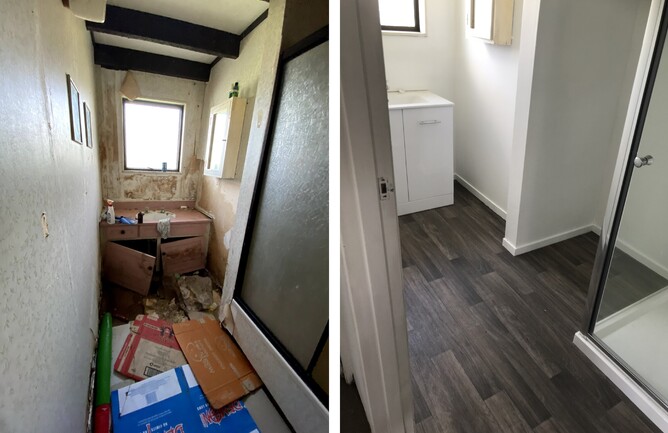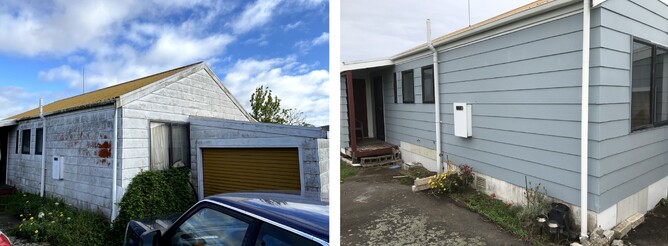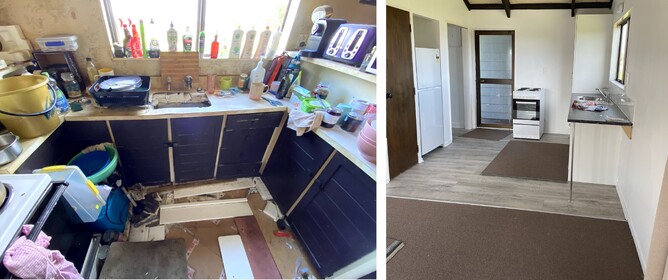It's a house on the street like any other. One that has had the ultimate makeover inside and out.
But it's not the kind of home reno you'll see on TV, but one that has had a lot more love, and community spirit, put into it.
Hundreds of volunteer hours and donated resources have transformed the rundown home from completely unliveable, to warm, safe and dry.
A kuia and her son lived inside. But like many, her home had gotten away from her. With no hot water, cooking facilities, heating or insulation, and floors so rotten they had to navigate across the joist to move around, a concerned family member was quick to try and help.
She urgently moved the kuia into respite care for her safety and wellbeing, and looked at commercial repair quotes. But the costs were out of reach.
She contacted Te Puni Kōkiri, who sent Sustainability Options to do a home assessment. The social enterprise identified the issues preventing the home from reaching 20°C and referred the home through to the 20 Degrees programme.
20 Degrees is a collaborative healthy housing programme based in the Bay of Plenty, dedicated to helping our community work towards warmer, drier and healthier homes that can reach 20°C cost-effectively. Sustainability Options is the delivery partner of the programme.
The programme soon got to work joining forces with other agencies, local charities and businesses to solve the issues making the home uninhabitable.
It was a big job made lighter by many hands.
The garden was first to be tackled, with Good Neighbour cutting the lawns that were overgrown and Curate Church clearing the garden.
20 Degrees repaired the floors with flooring donated by The Flooring Room and installed a new kitchen, bathroom, toilet and laundry. They also repaired and repainted the outside cladding and supplied a new hot water cylinder and stove.
DJ Contracting and Laser Plumbing Tauranga fixed the plumbing, and Smart Sparx worked to fix the unsafe electrical wiring in the home, with all businesses donating time and goods to cover the shortfalls needed.
Exterior Wash donated their services to wash the outside of the house, and Curate Church donated $1,000 towards paint and equipment, organising a crew to strip wallpaper, wash down the walls and repaint the whole internal of the house.
There was also plenty of whānau engagement, with family members clearing the rubbish from the underfloor and around the house, with six skips worth removed.
Now, eight months on, the house feels like a whole new home. Where there was once mould, draughts and dampness, now is a clean, warm, welcoming home, fitted with a brand-new bathroom, kitchen, carpet, lighting and more.
Phil Gregg from Sustainability Options worked on the project from start to finish. He says the generosity shown by these local businesses and community groups made it possible.
"We were incredibly fortunate to be supported by the goodwill of so many community groups and local businesses. Resene and Bunnings also provided us product at cost, Showerdome and Methven Tapware donated product, Curtain Bank Bay of Plenty donated curtains, and we've even had GIB come on board soon after this home was completed supplying product at cost for future projects.
"It all goes such a long way. 20 Degrees spent $8,000 out of our funding partners' contribution, but we achieved the equivalent of over $120,000 worth of maintenance. That is huge and goes to show just how much value this community collaboration has put in.
"And it's not just about the money, it's a lot of love that has gone into it too. Without these guys, we never would have achieved what we have."
Gert Strydom from Curate Church says the project was a huge success.
"The house was run down, on the outside as well as the inside. We were just shocked to find out that a beautiful elderly lady was staying in such poor conditions.
"We organised a half-day 'Serve our City' event to help out. We had about 20 people in my group, all varying in ages, doing multiple tasks. Tasks were cutting the grass again, trimming a lot of trees down to a maintenance level, clearing all green waste into skip bins, levelling of a compost heap and just a general clean up of the yard. It doesn't sound like much, but it was a mammoth task.
"A couple of weeks later, I got approached by Phil Gregg to assist with some more renovations within the house, and we gladly accepted. Curate church was willing to sponsor some paint and painting equipment, and I had to get people together to continue on with this project. So we managed to get a few days worth of painting done, inside and outside, to make the house into a livable domain.
"We as a church definitely feel honoured to be a part of such a project and that we can put aside our own wants and needs to serve the needs of others."
Todd Rowling, Project Manager at Good Neighbour, says the team got involved when Sustainability Options called to say they had a difficult project ahead.
"Once we had been for a look and assessed the project, we came on board and took a very good team to get stuck in. We took about 750kg of green waste off the area surrounding the house. This made a huge difference to this project and the outside surrounding the house.
"We love working with other organisations as everyone can contribute in their area of strength. We also love the feeling that the community can pull together and make a difference for a particular family."
Outside of the donated time, money, and resources, the project was funded through Te Puni Kōkiri grants, EECA grants, and the 20 Degrees programme.
20 Degrees is supported by funding partners TECT, BayTrust, Rotorua Trust, Bay of Plenty District Health Board, Toi Te Ora Public Health, and Western Bay of Plenty District Council, who have committed $1.5 million to the programme's roll out over the next three years.
Phil says the kuia's house is just one of tens of thousands of homes in the Bay of Plenty in dire need of repair.
"We see the cost to repair the bulk of the homes with repairs and maintenance ranging from $15,000 to $80,000 per house – and that's just to get them liveable. Nothing close to the standard we got this home up to.
"It's a story of the devastating state of our housing stock, and the real money that it is going to take to fix it. But it's about getting all these different parties together in a coordinated fashion to overcome some of these obstacles."
The 20 Degrees programme is not only helping resolve those existing housing stock issues but also helping with people's health and wellbeing, says Phil.
"All we are focusing on in society is how can we build new houses, while our existing housing stock is falling over big time. It is under huge stress because of the overcrowding, and it's been exasperated by Covid.
"That's how 20 Degrees came about, because our existing housing stock is in such bad condition, and through Covid, we saw a spike in rheumatic fever because of this overcrowding. Rheumatic fever costs the country $1 million through each person's lifetime, it's huge. So we are trying to tackle that problem before it gets to that point.
"In so many instances, we also see that we are helping bring back some confidence to people, some faith in society. People feel seen and listened to for the first time in a long time. They can't believe someone's actually caring. The act of just being there goes such a long way."






